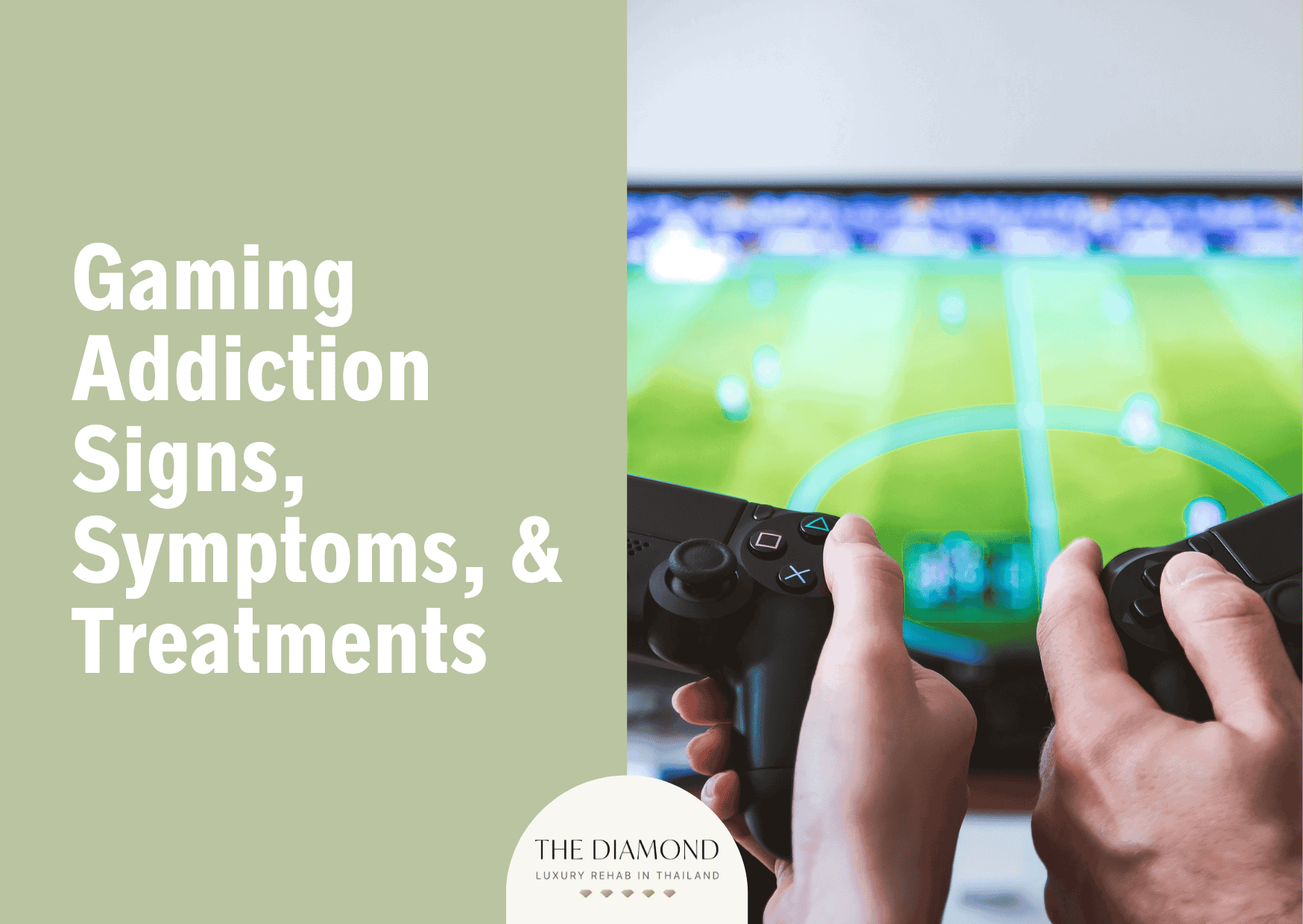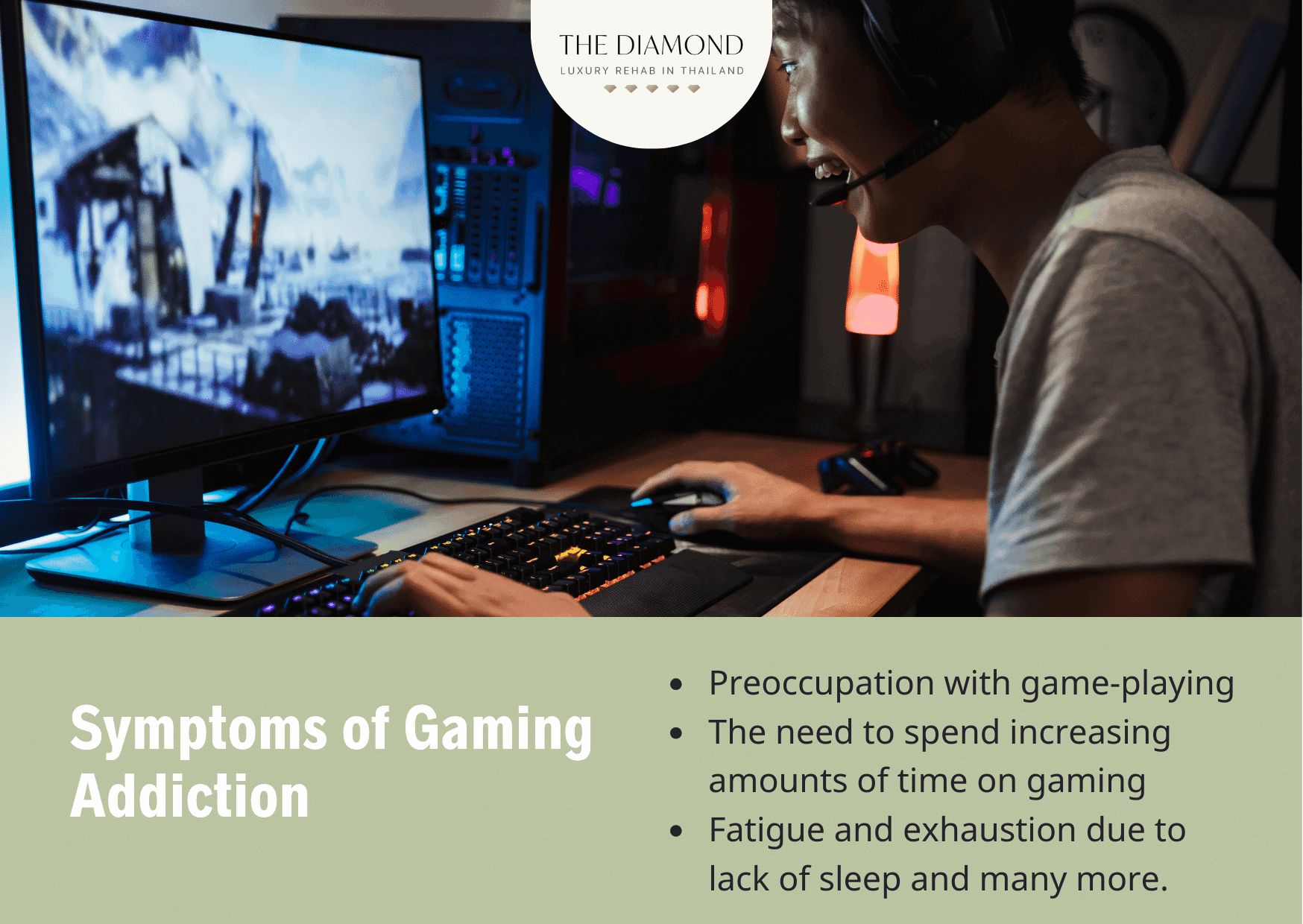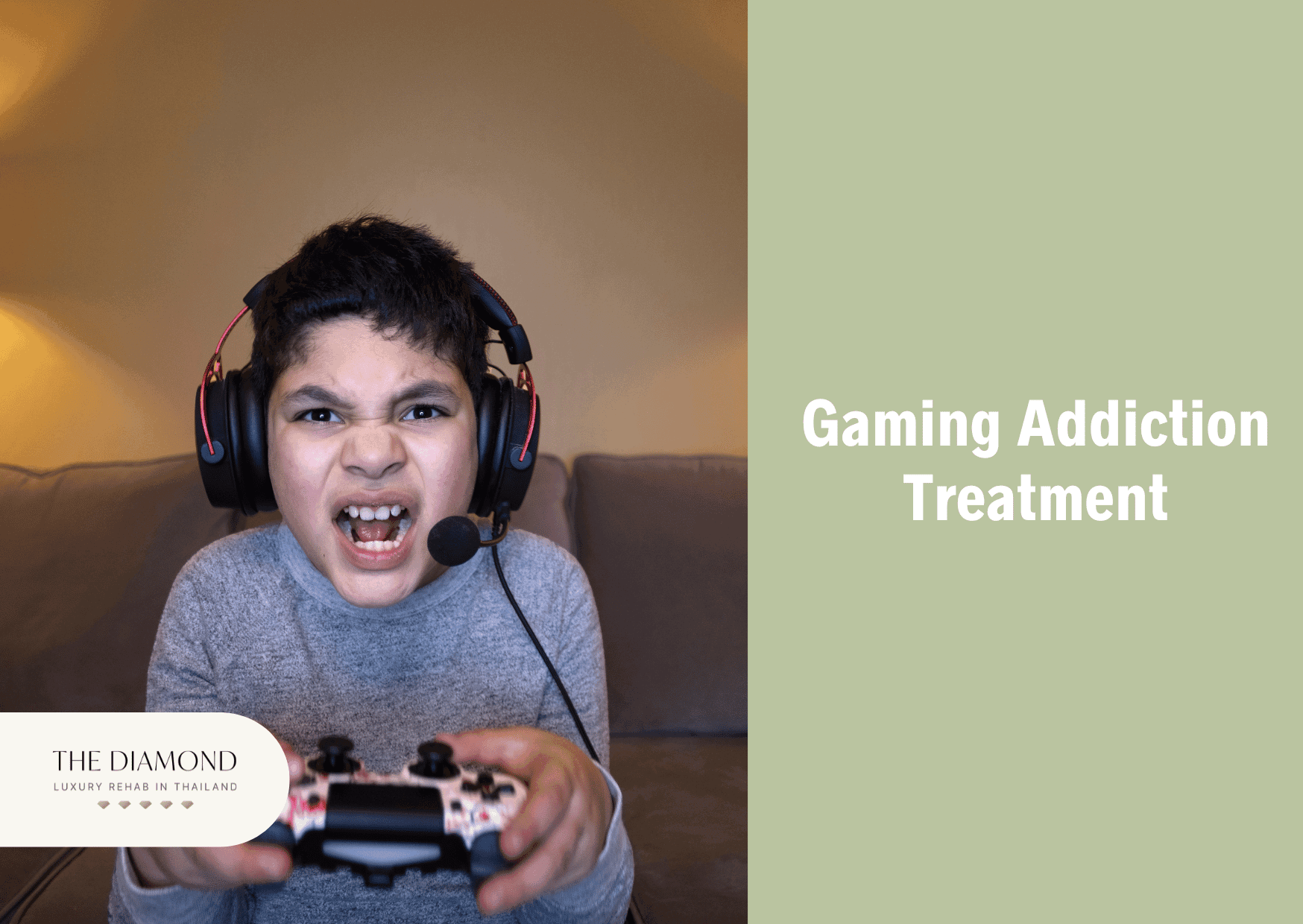Gaming addiction signs, symptoms, and treatments

Gaming addiction is the uncontrollable habit of engaging in video games that interfere with many areas of life.
The symptoms of gaming addiction include preoccupation with game-playing, increased irritability when unable to play a game, extreme tiredness due to lack of sleep, spending increasing amounts of time playing games, and isolation from family and friends.
The causes of gaming addiction include the addictive game design, a strong desire for escapism, the need for social approval, and underlying mental health problems.
The effects of gaming addiction include sleep deprivation, poor eating habits, lack of social skills, damaged personal relationships, and financial distress. These serious risks may result in grave repercussions if not promptly addressed.
What is gaming addiction?
Gaming addiction refers to an uncontrollable obsession with gaming to the extent that it dominates an individual’s life at the expense of important responsibilities, personal relationships, and life interests despite serious physical and mental health ramifications.
The World Health Organization’s 11th Revision of the International Classification of Diseases (ICD-11) further defines gaming addiction as a series of serious behavior patterns that cause notable problems in personal, relationship, social, educational, occupational, or other important aspects of life.
What are the causes of gaming addiction?
The causes of gaming addiction that could explain the development of addiction to games are listed below.
- Biological factors: Biological factors contributing to gaming addiction involve structural changes in the brain. Video games are designed to create immersive experiences for players. A review paper published in Brain Sciences by Dr. Daria J. Kuss and Dr. Mark D. Griffiths of the International Gaming Research Unit, Nottingham Trent University, explored the different neuroscience behind gaming addiction, including how the brain responds to high levels of exposure. Strong levels of video game immersion result in the production of high amounts of dopamine in the brain, which causes the brain to reduce receptors and counter the increased release of dopamine, making the brain less sensitive to dopamine. The person then develops a strong desire to seek out the same pleasurable activity again and again.
- Psychological factors: The psychological causes behind compulsive gaming are desires for escapism and underlying mental health disorders. Jin-Liang Wang and co-authors from Southwest University and Chongqing Youth and Vocational Technical College in China emphasized in a 2019 Frontiers in Public Health research that internet gaming addiction is associated with cognitive and emotional problems. Video game consumption may be fueled by motives to escape real-life issues and use gaming as a distraction and avoidant coping strategy. People who suffer from psychological disorders such as anxiety and depression also tend to use games as a way to cope with negative emotions.
- Social factors: Social factors such as instant gratification and the need for social approval. According to a 2023 paper published in the Asian Journal of Social Health and Behavior by psychologists Filzah Kakul and Sarah Javed of Aligarh Muslim University in India, social factors such as belongingness, escapism, motivation by the desire for achievement and recognition, social norms, and expectations contribute to the development of gaming addiction. Video games offer instant gratification and feedback that could be harder to achieve in real life. As a result, people may prefer gaming to enhance self-esteem and seek social gratification. Social interactions in video games also contribute to problematic gaming by inducing a sense of belongingness that is established in the virtual world, which encourages the pursuit of social connections within the game.
What are the effects of gaming addiction?
The effects of gaming addiction that can have serious negative consequences are listed below.
- Physical effects: The most common physical consequences of gaming addiction include sleep disturbances, headaches, a sedentary lifestyle, and hand and wrist injuries. In a 2022 paper published in the Annals of Medicine and Surgery by different professors from eight institutions in Pakistan, the UK, Sweden, and Taiwan, the research found that gaming addiction significantly impaired sleep quality, increased sleep disturbances, reduced sleep duration, and elevated daytime dysfunction.
- Emotional effects: Problematic gaming can negatively affect emotional well-being, such as increased emotional difficulties, the inability to deal with painful emotions and loneliness. Gaming disorders have been correlated with experiences of social isolation. According to a 2018 study published in the Iranian Journal of Public Health by Hülya KÖK EREN and Özlem ÖRSAL of the Eskişehir Osmangazi University in Turkey, loneliness increases as gaming addiction progresses. The lack of real-life connections may cause a gaming addict to be easily overwhelmed by negative feelings and unable to cope with challenging emotions.
- Mental effects: Hyperarousal and overstimulation induced by video games may adversely affect cognitive functions. Dr. Youssef Farchakhand of Holy Spirit University of Kaslik in Lebanon and co-authors from different institutions in Lebanon and Cyprus published a study on Child and Adolescent Psychiatry and Mental Health about memory, attention, and learning skills in Lebanese children. The study reported that video gaming addiction is linked to memory deterioration, attention deficit, and problems with concentration. Gaming addicts may find real-life situations less stimulating and engaging than the virtual environment, resulting in losing interest and motivation for tasks that demand more cognitive effort and focus.
- Psychological effects: Excessive gaming is associated with several psychological effects. In a 2023 paper published in the International Journal of Mental Health and Addiction, research assistant Alican Kaya of Ağrı İbrahim Çeçen University in Turkey and colleagues from different universities in Turkey and the UK emphasized the psychological effects of gaming addiction which includes increased anxiety, depression, mood swings, irritability, and loss of self-worth. Relationship problems due to gaming addiction may also exacerbate existing mental health problems. Conversely, individuals suffering from comorbid mental illnesses may engage in addictive behaviors around gaming to cope with difficult emotions.
- Short-term effects: The short-term effects of gaming addiction include hunger, poor personal hygiene, fatigue, eye strain, and missing out on family gatherings and social events with friends. Although these tend to be immediate effects of the disorder, once they become a pattern for an extended period, they may develop into more serious consequences.
- Long-term effects: Long-term effects of gaming addiction may significantly impair different areas of life. The long-term effects of gaming addiction can be devastating, including financial ruin, unemployment, expulsion from academic institutions, and increased aggression or violence. The disorder can also cause serious health risks such as diabetes, heart problems, and respiratory issues due to low levels of physical activity that are associated with video gaming.
What are the signs and symptoms of gaming addiction?

The signs and symptoms of gaming addiction that are indicative of problematic gaming are listed below.
- Preoccupation with game-playing: Excessive preoccupation with gaming and anticipation of the next gaming sessions are among the initial warning signs of gaming addiction. This anticipation and preoccupation distract an individual from more important activities in everyday life.
- The need to spend increasing amounts of time on gaming: When an individual develops tolerance from excessive release of and exposure to dopamine, they may feel the need to spend more time playing video games to achieve the same level of rewarding and pleasurable sensations initially experienced.
- Fatigue and exhaustion due to lack of sleep: It is common for video game addicts to jeopardize sleep over longer hours of gaming. This leads to fatigue and lack of energy due to sleep deprivation.
- Isolation from family or friends in favor of gaming: Individuals with gaming addiction may disconnect from family and friends as gaming occupies a significant amount of their time and attention.
- Irritability when unable to play a game: Someone with a gaming addiction may show signs of irritability and restlessness in the absence of video game activities, even for short periods of time.
- Lying to others regarding the amount of time spent gaming: A gaming addict may feel guilty and ashamed of the excessive amount of time spent engaging in gaming activities, resulting in consequences of lying to hide gaming from family and friends.
- Neglect of responsibilities at home, work, or school: Impaired control over gaming behavior may result in disregarding family and occupational or education responsibilities, which may have negative repercussions of poor academic and work performance and may ultimately result in expulsion or job loss.
Other possible gaming addiction symptoms include:
- Deteriorating personal hygiene, which can be a sign of self-neglect
- Losing interest in non-gaming activities or hobbies previously enjoyed
- Having multiple unsuccessful attempts to cut down on video game participation
- Using video games to relieve negative moods and emotions
- Playing despite obvious negative effects on physical and psychological functioning
How to overcome gaming addiction?
Gaming addiction can be overcome by acknowledging the problem, identifying triggers and behavior patterns that cause the addiction, and working on addressing the problem. One important step is setting strict time limits on any given gaming session and employing interventions that do not involve device screen time. Setting specific time limits on daily play can keep an individual from developing maladaptive behaviors.
Limiting playing time to at most two hours each day may be a first step to regulating gaming screen time by creating a timer on a mobile phone or other devices. Discovering other fun activities as a form of distraction is also helpful in curbing gaming addiction.
Gaming is often used as an escape from real-life stressful situations. It is critical to develop healthier coping strategies when overwhelmed with stress by discovering and engaging in fulfilling activities outside gaming. Establishing a healthier routine is beneficial for preventing gaming as a coping mechanism for stressful situations.
Overcoming gaming addiction can be a difficult process. Severe gaming addiction may require medical and psychological interventions with the help of trusted professionals.
What are the risk factors for gaming addiction?
The risk factors for gaming addiction that influence an individual’s risk of being addicted to video games are listed below.
- Being male: Males are at higher risk of developing gaming addiction. According to a 2020 paper published in BJPsych Advances by a team of researchers from different universities in the UK and India, the risk of developing gaming addiction is closely associated with more males engaging in gaming activities than females.
- Exhibiting aggressive behaviors: There is a correlation between gaming addiction and aggression. In a 2023 research article published in Frontiers in Public Health, Shunyu Li and colleagues from Xinjiang Normal University and other universities in China emphasized that exposure to fighting, competition, and violence in most online games promotes violent and aggressive tendencies and increases the risk of gaming addiction, especially for individuals exhibiting aggression.
- Dysfunctional impulsivity: Dysfunctional impulsivity is also a risk factor for substance- and non-substance addictions. A 2016 study published in Cyberpsychology: Journal of Psychosocial Research on Cyberspace by researchers from Masaryk University in the Czech Republic stressed that individuals with high levels of dysfunctional impulsivity tend to act quickly without considering the consequences of their actions. For instance, individuals with gaming addiction exacerbate existing health problems by playing video games for extended periods of time despite being ill.
- Lack of social skills: Gaming addiction can negatively impact an individual’s social competence, affecting the quality and quantity of social skills. The more severe the gaming addiction, the weaker the social skills.
- Poor emotional regulation: People with a limited ability to regulate emotions often exhibit inappropriate reactions to difficult circumstances and may use gaming to escape negative emotions.
How do you treat gaming addiction?

Gaming addiction is treated using different treatment approaches such as counseling, psychotherapy, 12-step programs, and medications. Individual and family counseling are both beneficial in treating gaming addiction.
One-on-one sessions with a counselor can help patients set attainable goals toward overcoming their addiction, while family therapy helps cultivate a supportive environment integral to recovery.
Cognitive behavioral therapy (CBT) is another helpful approach to treating gaming addiction. It is a common form of psychotherapy that looks to address the underlying drivers involved in the cycle of problematic video game use. According to a 2020 paper published in Frontiers in Psychology by Dr. Lucio Gros and colleagues from Université Libre de Bruxelles in Belgium and Maastricht University in the Netherlands, CBT helps reduce reliance and dependence on gaming to escape negative emotions or problems by allowing an individual to distinguish between happiness and feeling relieved.
On the other hand, 12-step programs such as Computer Gaming Addicts Anonymous and Online Gamers Anonymous offer a safe space for recovering addicts. These programs consist of peer groups who attend regular meetings driven by a course of action for video game addiction help.
Gaming addicts diagnosed with co-occurring psychological disorders such as anxiety, depression, or bipolar disorder may benefit from taking antidepressants and anxiety medications. This allows for holistic recovery that provides balanced care to address the needs of an individual.
Why is gaming addictive?
Gaming is addictive because it stimulates the brain like other addictive substances or behaviors. According to the same paper by Dr. Lucio Gros and colleagues from Université Libre de Bruxelles in Belgium and Maastricht University in the Netherlands, hyperarousal from video games triggers the release of high amounts of dopamine in certain regions of the brain, which is responsible for reward processing and cravings in the brain. Dopamine release during gaming is comparable to the effects of psycho-stimulant drugs in the brain.
Gaming is the practice of playing video games using a game console, mobile phone, or computer. It also serves different purposes for gamers. Gaming can be used for enjoyment, relaxation, socialization, overcoming boredom, and even health care uses such as pain management and occupational therapy. When played in moderation, video games can be beneficial for some people.
The advantages of gaming include better problem-solving skills, increased hand-to-eye coordination, better attention to detail, and improved teamwork skills. However, if gaming develops into a full-blown addiction, the repercussions may outweigh the positive effects of the activity.
Excessive video game use has several disadvantages, including increased aggression, lack of concentration, shorter attention spans, poor social skills, physical health risks, and the risk of addiction.
Another factor that makes video games addictive is game design. Video game developers design games with the gamer in mind and constantly look for ways for their creations to be intrinsically interesting. For instance, several games offer different attractions, such as stimulating graphics, good game mechanics, and interesting choices.
When is gaming addiction counseling necessary?
Gaming addiction counseling is necessary when excessive gaming interferes with normal functioning and jeopardizes various aspects of life. Counseling is also necessary to educate individuals with gaming addiction about their condition and provide them with quality emotional support during critical recovery time.
Therapy can also be done in groups or with family members. Group therapy consists of peer groups with whom gaming addict can discuss their concerns and receive advice and feedback. Meanwhile, family counseling helps family members find new ways to work together toward healthy recovery for a loved one and address issues that have affected the functioning of the family.
What are the symptoms of gaming addiction withdrawal?
The symptoms of gaming addiction withdrawal include anxiety, increased irritability, headaches, sleeplessness, aggressive behaviors, and emotional outbursts. Withdrawal symptoms can manifest physically and psychologically upon gaming abstinence or when playing time is decreased over long periods of time.
Can gaming addiction cause depression?
Yes, gaming addiction can cause depression. Evidence shows a strong correlation between gaming and depression, as video game overuse is a cause and a consequence of depression.
As a risk factor, gaming addiction can contribute to feelings of depression due to its socially isolating nature, where individuals are immersed in the virtual world, derailing their ability to socialize and make real friends. Compulsive gaming can also exacerbate comorbid psychiatric disorders such as anxiety, depression, and social phobia.
Pre-existing depression among individuals may also result in gaming addiction. Individuals suffering from depression may resort to gaming as a coping mechanism to deal with depression and avoid stressors and deeper problems instead of managing the root of the problems.
How does gaming affect the youth?
Gaming affects the youth by causing and exacerbating a plethora of physical and mental health problems. Chronic exposure to video games has been a long-standing concern among parents and experts. Existing studies that have revealed its negative effects are proof of the controversies surrounding the addictive activity.
Among the many negative effects of gaming on youth are weaker social skills, impaired school performance, sedentary lifestyle, lack of sleep, inability to manage emotional responses, increased aggression, manipulative behavior, pathological lying, and bullying.
Over time, the physical, behavioral, and attitudinal changes caused by gaming addiction in young people may contribute to low psychosocial well-being and poor quality of life.

